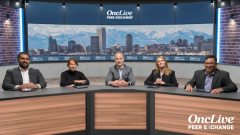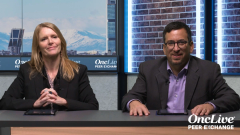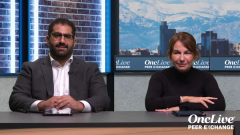
First-Line Treatment Strategies for Advanced Non–Small Cell Lung Cancer
A panel of thoracic medical oncologists provide an overview of first-line treatment strategies for advanced non–small cell lung cancer (NSCLC).
Episodes in this series

This is a synopsis of a Peer Exchange video series featuring Benjamin P. Levy, MD, of Sidney Kimmel Comprehensive Cancer Center at Johns Hopkins; Solange Peters, MD, PhD, of University Hospital of Lausanne; Joshua K. Sabari, MD, of NYU Langone’s Perlmutter Cancer Center; Edward B. Garon, MD, MS, of UCLA Jonsson Comprehensive Cancer Center; and Marina Chiara Garassino, MD, of University of Chicago Medicine Comprehensive Cancer Center.
Dr Levy opened by remarking on the rapid pace of new data and practice-changing developments in lung cancer coming out of recent ESMO and WCLC meetings, which will require interpretation to optimize clinical application.
Regarding first-line treatment for patients without targetable genomic alterations, Dr Sabari said most oncologists now obtain next-generation sequencing and PD-L1 expression analysis to guide immunotherapy options. Patients receive immunotherapy (anti–PD-1 or anti–PD-L1 agents) with or without chemotherapy, though some are reluctant to use pembrolizumab monotherapy below 50% PD-L1 expression. The major decision point is whether to incorporate a CTLA-4 inhibitor like ipilimumab. For PD-L1–positive patients, pembrolizumab, cemiplimab, and atezolizumab are approved options.
Dr Sabari stated we likely have most major first-line data now, with mainly incremental annual trial updates going forward. Dr Levy remarked on the incredible progress from the days when carboplatin-paclitaxel was standard treatment. He stated we can now offer personalized approaches leveraging precision medicine and targeted therapies. Dr Sabari said the biggest difference in first-line practices now is whether to incorporate a CTLA-4 inhibitor with various chemotherapy regimens.
In conclusion, Dr Levy characterized this as an era of tremendous scientific disruption and rapid innovation in lung cancer that will continue to push the field forward and improve patient outcomes.
*Video synopsis is AI-generated and reviewed by OncLive editorial staff.







































